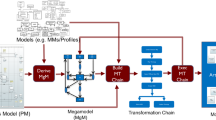Abstract
New mobile technologies such as Bluetooth or Wi-Fi suffer from many limitations and problems, especially when they are used in combination, whereas they are quite stable in small networks. The lack of specialised mobile middleware requires new methods in the design and execution of mobile information systems. We propose a two-phase approach to manage a mobile business process by partitioning a given workflow into several workflows, with each one governed by a controller. In the first phase, we introduce synchronisation tasks between different controllers. In the second phase, we create for each controller a local process view. Thanks to added tasks, the overall execution of all local workflows achieve the same result as the original one. The mobile scenario and the necessity for more automation lead us to choose the Business Process Execution Language for Web Services (BPEL4WS) as the language for the process definition.









Similar content being viewed by others
References
Aalst WMP van der, Weske M (2001) The P2P approach to interorganizational workflows. In: Proceedings of the 13th international conference on advanced information systems engineering (CAiSE 2001), Interlaken, Switzerland, June 2001, pp 140–156
Alonso G, Fiedler U, Hagen C, Lazcano A, Schuldt H, Weiler N (1999) WISE: business to business e-commerce. In: Proceedings of the 9th IEEE international workshop on research issues in data engineering: information technology for virtual enterprises (RIDE-VE’99), Sydney, Australia, March 1999, pp 132–139
Anyanwu K, Sheth A, Cardoso J, Miller J, Kochut K (2003) Healthcare enterprise process development and integration. J Res Pract Inf Technol 35(2):83–98
Baresi L, Maurino A, Modafferi S (2004) Partitioning of workflows on mobile information systems. In: Proceedings of the IFIP TC8 working conference on mobile information systems (MOBIS), Oslo, Norway, September 2004, pp 93-106
Eder J, Panagos E (1999) Towards distributed workflow process management. In: Proceedings of the international workshop on cross-organizational workflow management and coordination, San Francisco, California, February 1999
Gaertner G, Cahill V (2004) Understanding link quality in 802.11 mobile ad hoc networks. Internet Comput 8(1):55–60
Gardner T, Amsden J, Griffin C, Iyengar S (2003) Draft UML 1.4 profile for automated business processes with a mapping to the BPEL 1.0. IBM developerWorks. Available at http://www-128.ibm.com/developerworks/rational/library/4593.html
Grefen P, Aberer K, Hoffner Y, Ludwig H (2000) CrossFlow: cross-organizational workflow management in dynamic virtual enterprises. Int J Comput Syst Sci Eng 15(5):277–290
Jablonski S, Bussler C (1996) Workflow management: modeling concepts, architecture and implementation. International Thomson Computer Press, London
Jablonski S, Schamburger R, Hahn C, Horn S, Lay R, Neeb J, Schlundt M (2001) A comprehensive investigation of distribution in the context of workflow management. In: Proceedings of the 8th international conference on parallel and distributed systems (ICPADS 2001), Kyongju City, Korea, June 2001, pp 187-192
Judge D, Odgers B, Shepherdson J, Cui Z (1998) Agent enhanced workflow. BT Tech J 16(3):79–85
MAIS Consortium (2002) MAIS: multichannel adaptive information systems. Home page at W.W.W.MAIS-PROJECT.IT
Maurino A, Modafferi S (2003) Challenges in the designing of cooperative mobile information systems for the risk map of Italian cultural heritage. In: Proceedings of the 1st WISE workshop on multichannel and mobile information systems (MMIS 2003), Rome, Italy, December 2003, PP 203-216
Maurino A, Modafferi S (2004) Workflow management in mobile environments. In: Proceedings of international workshop on ubiquitous mobile information and collaboration systems (UMICS 2004), Riga, Latvia, June 2004, PP 93-95
Mohan C, Alonso G, Gunthor R, Kamath M (1995) Exotica: a research perspective of workflow management systems. Data Eng Bull 18(1):19–26
Muth P, Wodtke D, Weisenfels J, Kotz Dittrich A, Weikum G (1998) From centralized workflow specification to distributed workflow execution. J Intell Inf Syst 10(2):159–184
Reichert M, Dadam P (1998) Adeptflex—supporting dynamic changes of workflows without losing control. J Intell Inf Syst 10(2):93–129
Riempp G (1998) Wide area workflow management. Springer, Berlin Heidelberg New York
Thatte S (ed) (2003) Business process execution language for web services. IBM developerWorks. Available at http://www-128.ibm.com/developerworks/library/ws-bpel/
Vaughan-Nichols SJ (2003) The challenge of Wi-Fi roaming. IEEE Comput 36(7):17–19
Verbeek HMW, Hirnschall A, van der Aalst WMP (2002) XRL/Flower: supporting interorganizational workflows using XRL/petri-net technology. In: Proceedings of the 14th international conference on advanced information systems engineering (CAiSE 2002), workshop on web services, e-business, and the semantic web (WES 2002), Toronto, Canada, May 2002. Lecture notes in computer science vol 2512, Springer, Berlin Heidelberg New York, pp 93–108
Acknowledgments
This work has been developed within the Italian MURST-FIRB Project MAIS (Multichannel Adaptive Information Systems) [12].
Author information
Authors and Affiliations
Corresponding author
Rights and permissions
About this article
Cite this article
Maurino, A., Modafferi, S. Partitioning rules for orchestrating mobile information systems. Pers Ubiquit Comput 9, 291–300 (2005). https://doi.org/10.1007/s00779-004-0333-4
Received:
Accepted:
Published:
Issue Date:
DOI: https://doi.org/10.1007/s00779-004-0333-4




